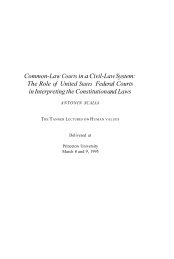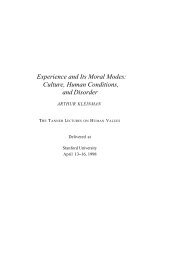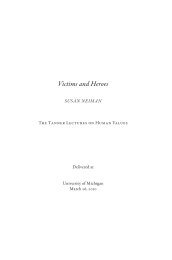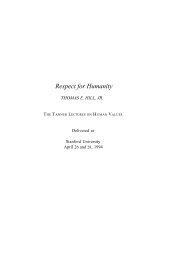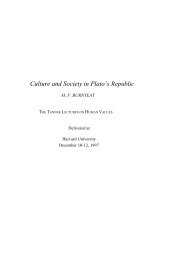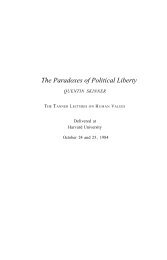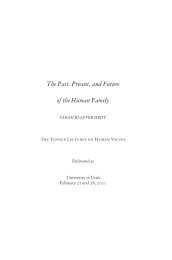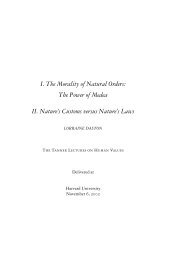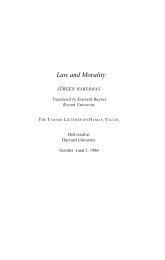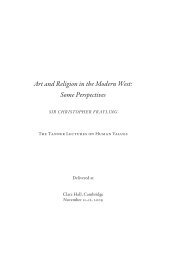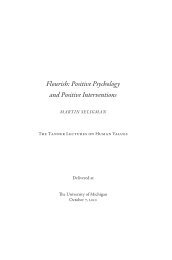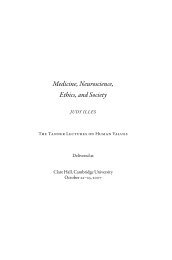Muguerza, Javier - The Tanner Lectures on Human Values
Muguerza, Javier - The Tanner Lectures on Human Values
Muguerza, Javier - The Tanner Lectures on Human Values
You also want an ePaper? Increase the reach of your titles
YUMPU automatically turns print PDFs into web optimized ePapers that Google loves.
104 <str<strong>on</strong>g>The</str<strong>on</strong>g> <str<strong>on</strong>g>Tanner</str<strong>on</strong>g> <str<strong>on</strong>g>Lectures</str<strong>on</strong>g> <strong>on</strong> <strong>Human</strong> <strong>Values</strong>like the general will, would not be c<strong>on</strong>tent with a c<strong>on</strong>sensus thatmerely reflected the total of a series of individual interests but<strong>on</strong>e that shed light <strong>on</strong> the general interest of the community, thatis, the “generalizable interests” of its members, by means, as wesaw, of a rati<strong>on</strong>al c<strong>on</strong>sensus. Naturally, the Habermasian versi<strong>on</strong>of c<strong>on</strong>sensualism - an heir of Rousseau’s general will - faces nofewer problems than c<strong>on</strong>venti<strong>on</strong>alism, some of which we will menti<strong>on</strong>presently. But, for the moment, let us deal with Habermas’sinsistence <strong>on</strong> procedural rati<strong>on</strong>ality.According to Habermas, procedural rati<strong>on</strong>ality gains c<strong>on</strong>siderati<strong>on</strong>“with the proof of its capacity for generalizati<strong>on</strong> of interests(durch die Prufung der Verallgemeinerungsfähigkeit v<strong>on</strong>Interessen).” 57 This would provide a critical standard for theanalysis and evaluati<strong>on</strong> of the political reality of a state of law,a state, in other words, “that derives its legitimacy from a rati<strong>on</strong>alityof the procedures for the promulgati<strong>on</strong> of laws andthe administrati<strong>on</strong> of justice designed to guarantee impartiality(der seine Legitimitat aus einer Unparteilichkeit verbürgendenRati<strong>on</strong>alitat v<strong>on</strong> Gesetzgebungs- und Rechtsprechungsverfahrenzieht).” 58As a matter of fact, the procedural rati<strong>on</strong>ality thatpresides over Habermas’s ethics of discourse is naturally nostranger to law, to positive law. We must look, therefore, to the“rati<strong>on</strong>ality of law” for an answer to the questi<strong>on</strong> of how legitimacyis achieved through legality. Now, Habermas does notagree with Max Weber’s belief that the rati<strong>on</strong>ality inherent in thelaw as such provides - aside from all kinds of moral presuppositi<strong>on</strong>sand implicati<strong>on</strong>s - the ground for the legitimizing force oflegality : in Habermas’s opini<strong>on</strong>, the legitimizing force would corresp<strong>on</strong>drather to the procedures charged with instituti<strong>on</strong>alizingthe foundati<strong>on</strong>al demands of the current legality, as well as to theargumentative resources available to achieve those demands. 59<str<strong>on</strong>g>The</str<strong>on</strong>g>57 Habermas, “Wie ist Legitimitat,” 11.58 Ibid.59 Ibid., 12.



